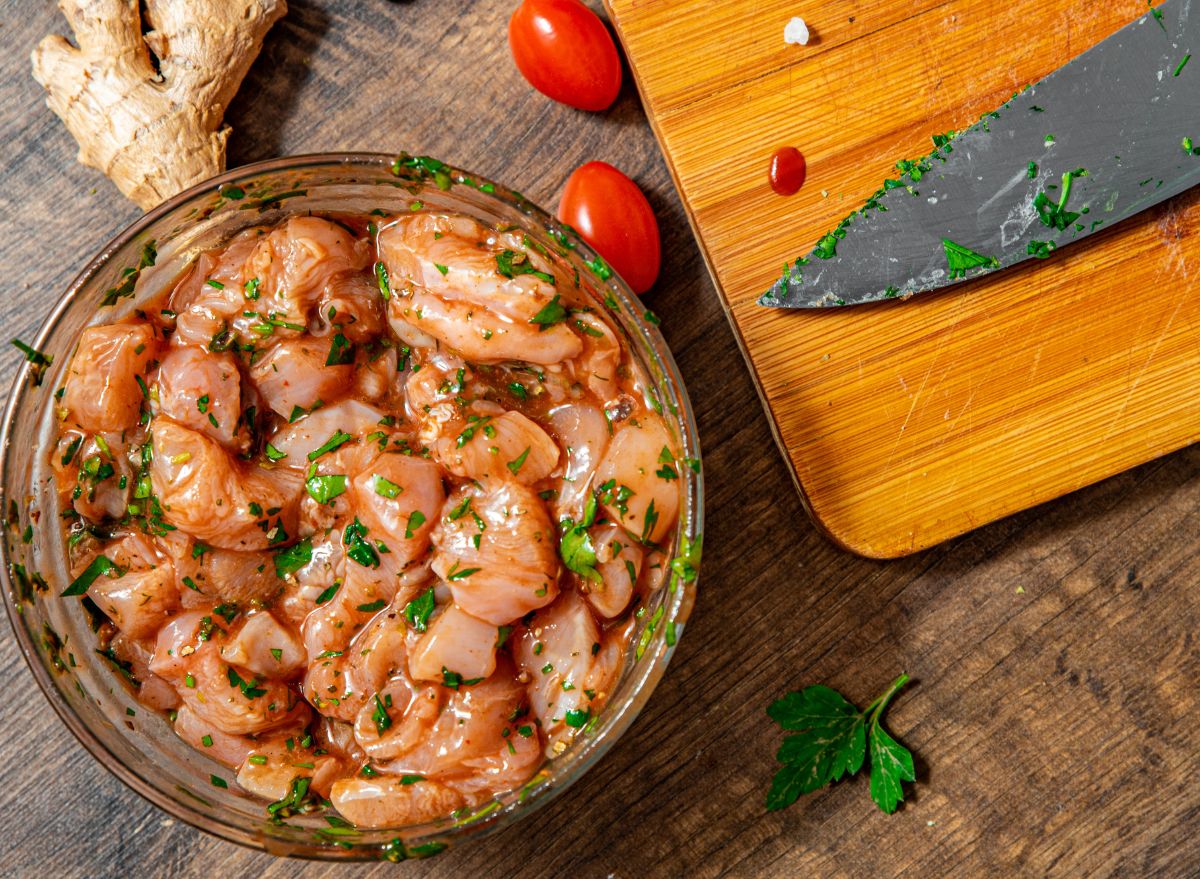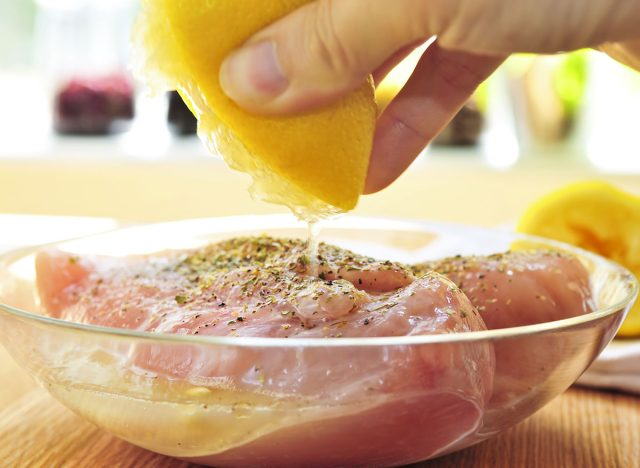This Is Exactly How Long You Should Be Marinating Chicken, According to Chefs

Chicken can be a finicky protein. It either comes out juicy and flavorful, or dry-as-a-bone and bland. For a winning chicken dinner, chefs agree that the key is to marinate the bird.
Yes, soaking it in a mixture of liquid and spices is the secret to forgoing a boring bird and, ultimately, making a meal your family won't complain about. Here, professional chefs share how long to marinate chicken and the easy marinades they rely on at home. Then, after you've perfected your poultry, check out The Absolute Best Way to Marinate Steak, According to a Chef.
How long should you marinate chicken?
When it comes to marinating chicken, it all depends on how much time you have. "If it's dinner time and you need to whip up a quick but delicious recipe, marinating your chicken for a minimum of 30 minutes will suffice. However, you can also leave it in the fridge to marinate for up to 6 hours if you have the time," say Chef Kevol Graham and Chef Omar Loney of Kokomo, a Caribbean restaurant in NYC.
The longer you marinate it, the more time the chicken has to absorb the flavors. However, you don't want to overdo it, because marinating for too long can make your chicken tough.
"As a rule of thumb for chicken breast, thighs, and drumsticks, I recommend marinating for at least two hours. But overnight, up to 24 hours, is best for maximizing flavor," says Sam Kass, James Beard Award-winning chef, former Obama administration's chef and Senior Policy Advisor for Nutrition Policy, and Chief Strategy Officer at Do Good Chicken.
But if you're really strapped for time, a minimum of 30 minutes will do the trick.
Here's a cheat sheet for how long you should marinate your chicken, according to the chefs we spoke to:
- Chicken breast: 30 minutes to 2 hours
- Dark meat like thighs or drumsticks: 30 minutes to 4 hours
- Whole chicken: 4 to 12 hours hours (or overnight) depending on the acidity level of the marinade that you are using.
What kind of marinades are best?

Chicken is incredibly versatile, which makes it the perfect option for experimenting with flavor. While the ingredient combos are endless, any good marinade should contain three essential ingredients: Acid (such as vinegar or citrus), an oil or fat (like sesame oil or buttermilk), and a flavoring agent (herbs and spices), say chefs Graham and Loney.
Chef Nate Berg, culinary manager at UNFI, the largest publicly traded wholesale distributor in the U.S., recommends using an acid (like vinegar, wine, citrus) and/or a fruit that contains digestive enzymes (pineapple, mango, papaya or ginger). "Acids break down and denature the proteins in the meat to add moisture, and the digestive enzymes break down the connective tissue and muscle fibers making the chicken more tender. You can then build your marinade around those ingredients to create the flavor that you are looking for, but be sure to use salt, pepper, and lots of fresh herbs," he says.
Another great way to create a marinade is to use dairy as your base, like yogurt or buttermilk. One thing to note is that dairy-based marinades typically act slower than non-dairy marinades, so marinating times should be doubled, chef Berg says.
"A simple, go-to recipe for me is lots of garlic, lemon juice and zest, along with fresh herbs like thyme and rosemary," says chef Kass. "If you like spice, try using plain yogurt, garlic, cumin, lemon, and chilies – it's a delicious combination that packs some heat."
RELATED: 73 Healthy Chicken Recipes for Weight Loss
How to marinate chicken
Once you've decided on the marinade you want to use, all you have to do is combine the ingredients and let them work their magic. The way you pair and combine these elements transforms the taste and texture of your meat. Here's how to marinate chicken, according to chefs Loney and Graham:
- Before you start, take your chicken out of its packaging and pat it dry.
- Grab a bowl, toss all your ingredients together, and give them a good mix.
- Pierce your chicken with a fork to allow the flavors to penetrate the meat, then let sit for at least 30 minutes. You can also put all the ingredients with your chicken into a zip-top bag and let it marinate in the fridge for a few hours if you have the time.
Pro tip: Avoid using metal containers for marinating chicken as the acids in the marinade could react with the metal, giving the chicken an off flavor, says chef Berg. "I typically use a large zip-top bag so that I can squeeze all of the air out, but a glass or plastic container will also do just fine."








